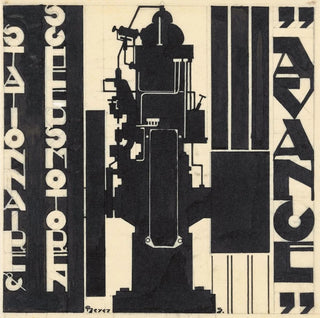Art print | Conception pour la publicité des moteurs de navire Avance Stationnaire - Reijer Stolk


View from behind

Frame (optional)
Stationary Advance: nautical aesthetics staged by Reijer Stolk
This art print of the Ship Engines Advertisement Design for Stationary Advance stands out with a balanced composition and clean graphics, where lines, volumes, and industrial colors create an immediate visual presence. Deep tones evoke steel and the sea, while contrasting touches draw the eye to the engine, suggesting power and reliability. The poster technique combines typographic precision and shape simplification, giving the image an atmosphere that is both technical and elegant. The key elements — ship silhouette, apparent mechanism, and logical layout — work together to tell a story of performance promise.
Reijer Stolk, master of modern poster art
Reijer Stolk is recognized for his contribution to 20th-century advertising graphics, particularly in the industrial and maritime fields. Influenced by modernist currents and the Bauhaus, he favored visual clarity, functional typography, and an economy of means that reinforced the commercial message. His posters and designs for industry helped standardize an aesthetic where efficiency combines with graphic elegance. This piece continues a tradition of creations that have marked visual communication of technical products, while also being appreciated for its ability to translate technicality into a speaking image.
A decorative acquisition with multiple assets
This art print of the Ship Engines Advertisement Design for Stationary Advance is ideal for decorating an office, a reception hall, a workshop, or an industrial-style living room. The fidelity of the rendering preserves the graphic strength of the original: contrast, grain, and proportions are maintained to offer a professional visual impact. Choose this art print of the Ship Engines Advertisement Design for Stationary Advance if you want a piece that evokes industrial history and sleek design. Also available on canvas, this version adds a warm texture while remaining true to the spirit of the original poster.

Matte finish

View from behind

Frame (optional)
Stationary Advance: nautical aesthetics staged by Reijer Stolk
This art print of the Ship Engines Advertisement Design for Stationary Advance stands out with a balanced composition and clean graphics, where lines, volumes, and industrial colors create an immediate visual presence. Deep tones evoke steel and the sea, while contrasting touches draw the eye to the engine, suggesting power and reliability. The poster technique combines typographic precision and shape simplification, giving the image an atmosphere that is both technical and elegant. The key elements — ship silhouette, apparent mechanism, and logical layout — work together to tell a story of performance promise.
Reijer Stolk, master of modern poster art
Reijer Stolk is recognized for his contribution to 20th-century advertising graphics, particularly in the industrial and maritime fields. Influenced by modernist currents and the Bauhaus, he favored visual clarity, functional typography, and an economy of means that reinforced the commercial message. His posters and designs for industry helped standardize an aesthetic where efficiency combines with graphic elegance. This piece continues a tradition of creations that have marked visual communication of technical products, while also being appreciated for its ability to translate technicality into a speaking image.
A decorative acquisition with multiple assets
This art print of the Ship Engines Advertisement Design for Stationary Advance is ideal for decorating an office, a reception hall, a workshop, or an industrial-style living room. The fidelity of the rendering preserves the graphic strength of the original: contrast, grain, and proportions are maintained to offer a professional visual impact. Choose this art print of the Ship Engines Advertisement Design for Stationary Advance if you want a piece that evokes industrial history and sleek design. Also available on canvas, this version adds a warm texture while remaining true to the spirit of the original poster.






